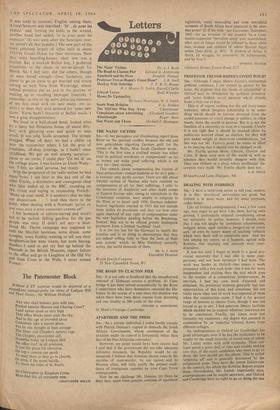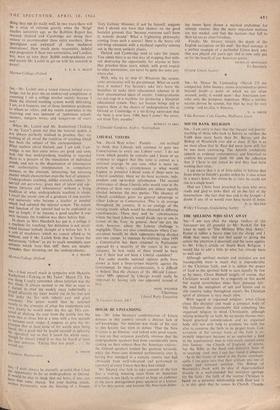DEALING WITH OXBRIDGE SIR,-1 have a surprising secret to tell
your readers. It is this: provincial universities are good, but Oxford is in some ways, and for some purposes, rather better.
Like all Oxford undergraduates, I was, a few years ago, very eager to get here. Like them, having once arrived, I particularly enjoyed complaining about my university. In justice, however, I should, state , that I was not taught by 'ambitious schoolmasters, indigent wives, aged retainers, hangers-on of every sort,' or even by tutors weary of teaching 'subjects which bore them stiff to unsuitable men.' And the best among my tutors, as it happens, agreed with Robbins that teaching and research were inter- dependent.
It was not until I began to teach in a good pro- vincial university that I was able to make com- parisons, and saw how fortunate I had been. The work was harder at Oxford—two essays a week compared with a few each term—but it was far more independent and exciting than the sort which goes to the routine of a compulsory lecture-course. In tutorials, I had my own work discussed and criticised; the provincial students generally had less opportunities of this kind, and sometimes did not really know what sort of work was expected of them when the examination came. I had a far greater range of lectures to choose from, though I.was not forced to go to any. I had generous library facilities which enabled me to explore whatever interested me to its conclusion. Finally, my tutors were not normally my examiners: my degree was assessed in consultation by an impartial tribunal drawn from different colleges.
An undergraduate at Oxford (or Cambridge) has great advantages, even if he has the misfortune to be taught by the small minority of bored men of whom Mr. Laslett writes with such sympathy. Their col- leges spend a great deal of time and trouble making sure that, of the many candidates who want to go to them, the best should get the places. This is called 'creaming off and is generally denounced by the enlightened press. They have the lOwest failure-rate in the country, for which the Robbins Report praises them. Nevertheless, Mr. Laslett impatiently says, undergraduates can be taught anywhere, and Oxford and Cambridge have no right to go on doing the one thing they can do really well. In two years there will be a crisis of extreme gravity when the 'Bulge' reaches university age, as the Robbins Report has warned. Oxford and Cambridge are doing their utmost to accommodate these extra numbers. How `prestigious and awkward' of these mediaeval institutions! How much more reasonable, helpful and progressive if these two universities, and London, too, were to turn their 30,000 undergraduates out and enable Mr. Laslett to get on with his research in peace!







































 Previous page
Previous page